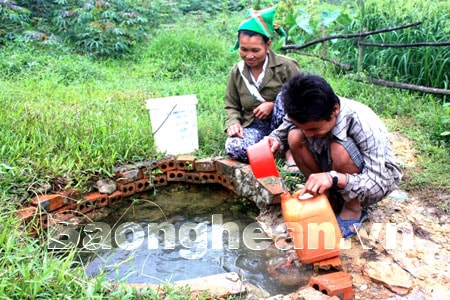Removing difficulties for people in resettlement areas
(Baonghean) - According to the commitment that has been implemented in cases of people having to relocate when building industrial parks and hydroelectric plants, resettled households when arriving at the new location will be arranged with conditions to ensure a better life, or equal to the old place of residence. In particular, the issue of infrastructure, production land and jobs for people in these cases will be given top priority. However, in reality, people in resettlement areas are facing many difficulties.
(Baonghean) - According to the commitment that has been implemented in cases of people having to relocate when building industrial parks and hydroelectric plants, resettled households when arriving at the new location will be arranged with conditions to ensure a better life, or equal to the old place of residence. In particular, the issue of infrastructure, production land and jobs for people in these cases will be given top priority. However, in reality, people in resettlement areas are facing many difficulties.
For example, at the Ban Ve hydropower resettlement area in Thanh Chuong, according to the project's standards, when moving to the resettlement area, each family is divided 1,000 square meters of garden land and residential land and 1-1.5 hectares of production land. However, in recent years, because the transfer to the resettlement area must be carried out at the same time, it is scattered in many stages. When the boundary division has not been implemented decisively, there has been a situation where households who moved earlier encroached on the land of households who came later, and local people encroached on the land of resettled people. Therefore, those who moved earlier have a lot of land, while those who came later lack land for production.

The tank has no water, people have to go and draw water for use.
Furthermore, the areas chosen for resettlement are not fertile land areas, but on the contrary, those areas are often reclaimed land on slopes so they are easily eroded and lose nutrients, leading to ineffective production, making production difficult for people, and the food produced is not enough to eat. Right in Kim Hong village (Ngoc Lam commune, Thanh Chuong), this is a village that was relocated quite early in 2009 on the basis of the entire population of Kim Hong village, Kim Tien commune, Tuong Duong district. Although they returned early, the households of this village do not have enough land for production, the whole village has 103 households/438 people (Thai ethnic group), of which 101 households are poor and hungry. The agricultural land of the village is mainly rocky soil, so it can only grow cassava for a few seasons before becoming barren again.
Besides, there is an equally serious problem of clean water for the people. In Kim Hong village, when planning to build the resettlement area, 6 self-flowing water tanks were built, with this number of tanks "expected" to be able to provide clean water all year round for the people. However, up to now, after only a few flood seasons, these tanks have fallen into a state of being abandoned, the water no longer reaches the tanks. Therefore, to have water for use, people have had to go down to the low-lying areas to dig holes to get water for temporary use.
Mr. Lo Hoai Dung - Chairman of the People's Committee of Ngoc Lam commune said: Lack of land for production and lack of clean water for use is the common situation of the commune today. The lack of land for production has led to a lack of jobs, causing social evils to arise, the most obvious of which is drug addiction. Currently, the whole commune has up to 83 drug addicts. And also because of difficulties such as lack of water and land for production, up to now, the whole commune has had 10 households (43 people) who have returned to their hometowns.
From the reality of the difficulties of resettled people in general, and the resettlement of Ban Ve hydropower plant in Thanh Chuong in particular, it is necessary to have a separate credit policy for households in resettlement areas to borrow capital to change their occupations, export labor, expand production... Because if there is no separate, specific policy, it will be difficult for people to access loans. It is necessary to supplement policies to continue supporting food, land reclamation costs to expand production areas, vocational training... for people.
Dang Nguyen






